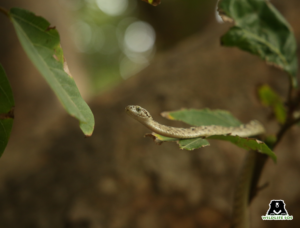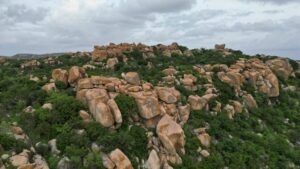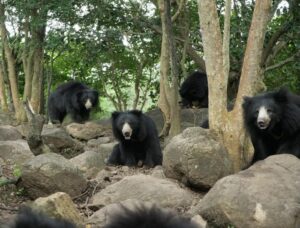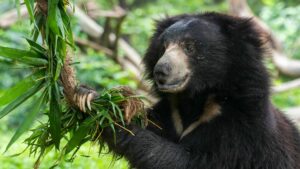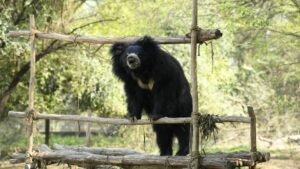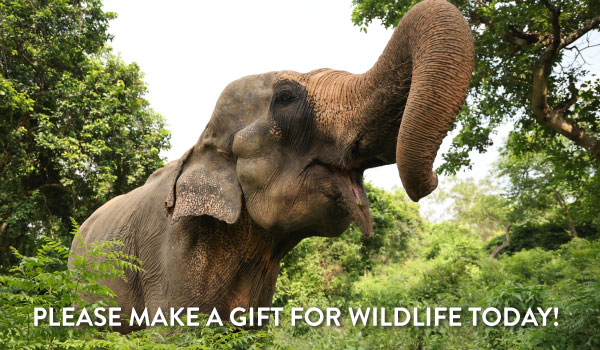Captivity takes many forms.
It can look like chains around an elephant’s feet, a wire being threaded through a sloth bear’s muzzle to make him more ‘obedient’ or like silence in a courtroom where justice is long overdue. In India, where wildlife protection laws are robust yet underutilised, the line between legislation and action is often a blurred one. But what of those tasked with protecting these voiceless beings?
On June 7, 2025, Wildlife SOS and the Uttar Pradesh Forest Department came together to ensure that they do. At Hotel The Lalita Grand in Mathura, nearly 100 participants from across the legal enforcement and conservation spectrum gathered for the second edition of the legal workshop titled ‘Wildlife Crime, Investigation and Prosecution’, the first of which took place in 2023. The workshop on the realities of wildlife law enforcement in India reflected not just missed opportunities or procedural delays, but also hope, collaboration, and change in motion.
When the Law Meets the Wild
The workshop was inaugurated by a distinguished panel of guests, led by our Chief Guest, Hon’ble Mr. Justice Chandra Dhari Singh — Judge of the Allahabad High Court, and Guest of Honour, Mr. Sidharth Luthra — Senior Advocate at the Supreme Court of India and former Additional Solicitor General.Other dignitaries present included Mr. Vinod Singh Rawat, Principal Secretary (Law) & LR, Government of Uttar Pradesh; Dr. Anil Kumar Patel, IFS and Conservator of Forests, Agra Circle; Dr. C.P. Sharma, Principal Technical Officer of the Forensic Cell at the Wildlife Institute of India; and senior forest officers from Mathura, Agra, Hathras, Etah, and the National Chambal Sanctuary.
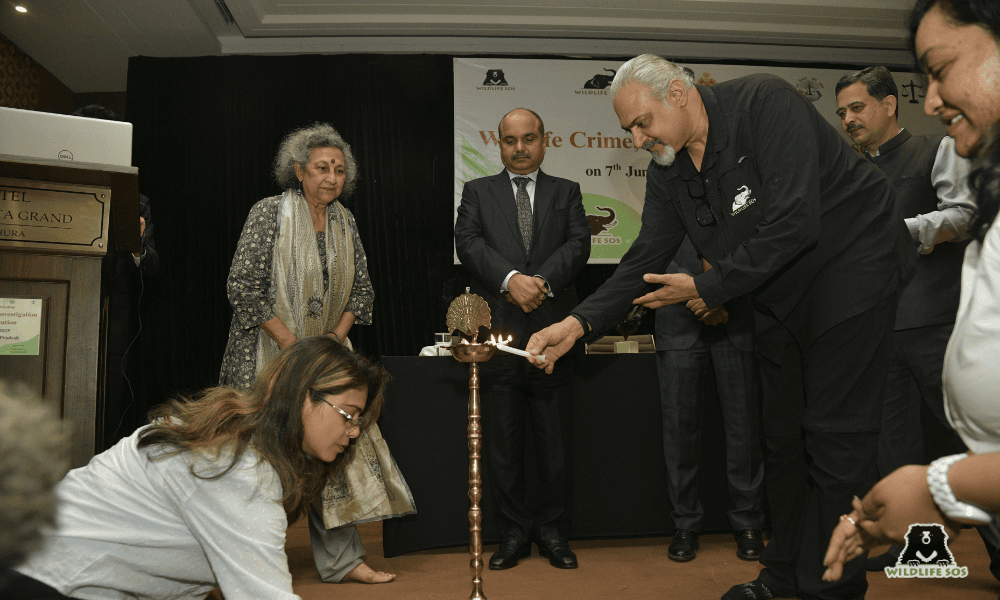
Mr. Kartick Satyanarayan, CEO and Co-founder of Wildlife SOS, delivered the inaugural address, after which Sr. Adv. Sidharth Luthra was welcomed to share his insights and valuable perspective for environmental conservation. Mr. Luthra’s speech drew from his extensive legal career, representing the Union and States in high-profile cases such as the 2G Spectrum Scam and the “Nirbhaya case” — as well as his passionate advocacy for animal protection, including in the Wildlife Rescue and Rehabilitation Centre v. UOI case concerning captive elephants.
The presence of Hon’ble Justice Chandra Dhari Singh, Judge at the Allahabad High Court as Chief Guest reflected the judiciary’s growing engagement in environmental protection and constitutional justice for the voiceless — a theme that resonated throughout the workshop.
Over the course of the entire day, the spotlight shined on pressing issues such as evidentiary standards, trial delays, and inter-agency coordination.The workshop brought together a total of nine esteemed speakers and participants, and was structured into two focused sessions, each designed to move beyond legal theory and into tactical ground realities.
The first session featured enforcement of wildlife law and legal prosecution. Upholding wildlife conservation throughout his career, Sh. Sangram Singh Katiar, IFS and Director of the Sariska Tiger Project, shared valuable inputs on safeguarding majestic tigers and precious biodiversity. His inspiring talk was complemented by remarkable insights of critical forensic tools for wildlife crime scene investigation when forensic expert Dr. C.P. Sharma from the Wildlife Institute of India (WII) took the dais. Sh. Mukesh Sharma, former DCF Agra who is a passionate environmentalist, carried the baton of sharing knowledge by discussing conservation of both natural and cultural landscapes. Sh. Rajan Dahiya, CBI Senior Prosecutor who has expertly handled complex legal cases, explored the collection and admissibility of electronic evidence in wildlife cases. Finally, distinguished professional Smt. Vaishali Agavale, APP, Mulund Court, shared her experiences on prosecuting wildlife offenders.
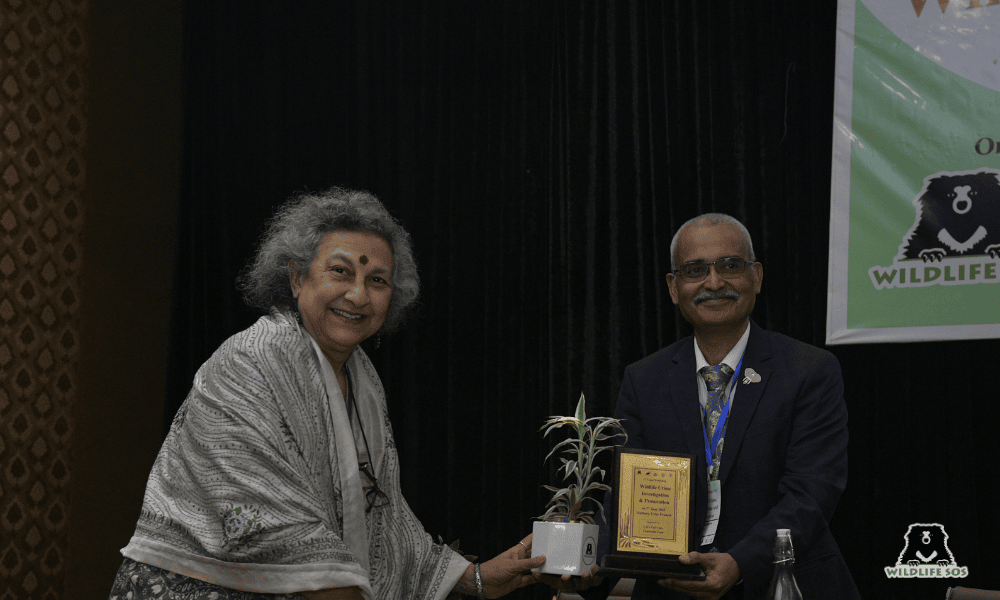
The second session focused on legal perspectives from seasoned advocates including Smt. Nirmala Nayak, Sh. Sanjay Kumar Singh, Sh. Yudhveer Singh Chauhan, and Sh. Satya Narayan Vashishth, Legal Advisor to Wildlife SOS. Their discussions highlighted the critical role of legal interpretation, timely intervention, and effective prosecution in improving wildlife protection outcomes.
The Elephant in the Room
Wildlife crime in India is rarely an isolated act. Often tied to larger syndicates involved in weapons, narcotics, and human trafficking, these cases demand the same degree of seriousness and interdepartmental coordination as any major organised crime. The workshop organised and held by Wildlife SOS stressed on this overlap and called for more robust tracking, quicker judicial processes, and stronger linkages between field officers and legal teams.Among the many examples presented, Laxmi’s case was at the heart of the day’s emotionally and legally charged discussions.Rescued in July 2013 by Wildlife SOS, the elephant Laxmi arrived morbidly obese, with an unhealthy appetite only for oily street food that her owners carelessly fed her. Her body bore the evidence: chronic health conditions, damaged limbs due to her weight, and all baggage that come along with being a ‘begging’ elephant. But then came the legal challenge.
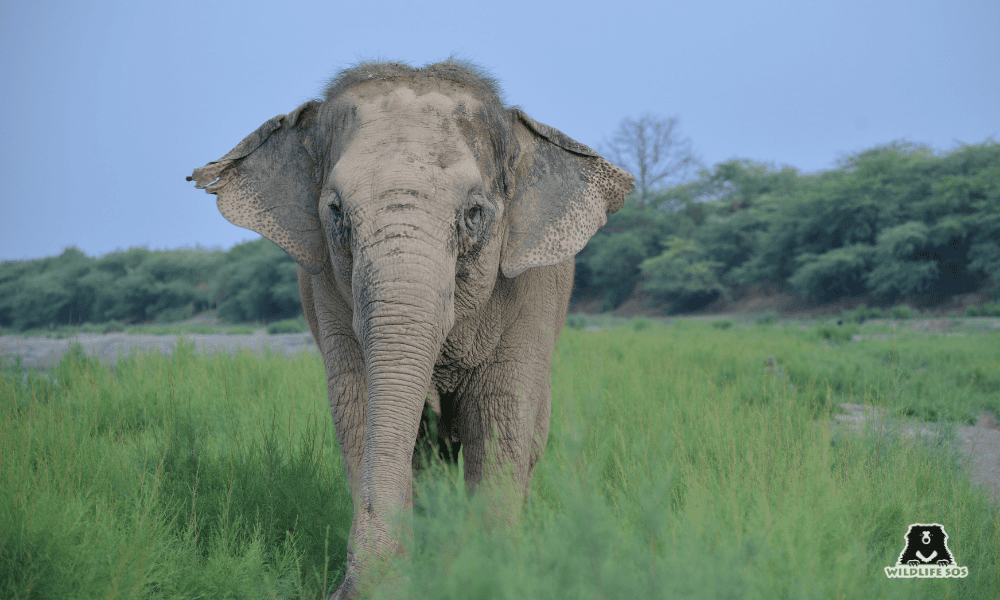
Despite her improved condition and ongoing treatment, her former owners attempted to regain custody, using a procedural loophole to stop her transfer. What followed was a long-drawn legal battle, with the courtroom becoming a battleground of veterinary documentation, precedent, and above all, moral responsibility. The discussion of her case served as a demonstration of how critical legal preparedness can be to secure the freedom and future of captive animals. Laxmi is safe with us today as we won the case, but the main takeaway remains that we are in dire need for preventative measures against legal loopholes.
Closing Remarks
As the day drew to a close, the valedictory session honoured the commitment and collaboration of all participants. Mr. Vinod Singh Rawat, Principal Secretary (Law) & LR, Government of Uttar Pradesh, and Dr. Anil Kumar Patel, IFS Agra Circle, led the certificate distribution.Mr. Rawat, former Director of The Journal of Information Technology Research (JITR), Lucknow, recalled his past collaboration with Wildlife SOS and underlined the importance of regular judicial sensitisation programmes. Dr. Patel, combining veterinary science and forest expertise, recalled his experience of handling a case that lasted a decade, and stressed the importance of coordination among multiple departments for effective wildlife crime prosecution.The concluding remarks and heartfelt vote of thanks were delivered by Sh. Satya Narayan Vashishth, Legal Advisor to Wildlife SOS, who underscored the importance of continuing these dialogues and carrying forward the momentum of collaboration between judiciary, enforcement, and conservation bodies.
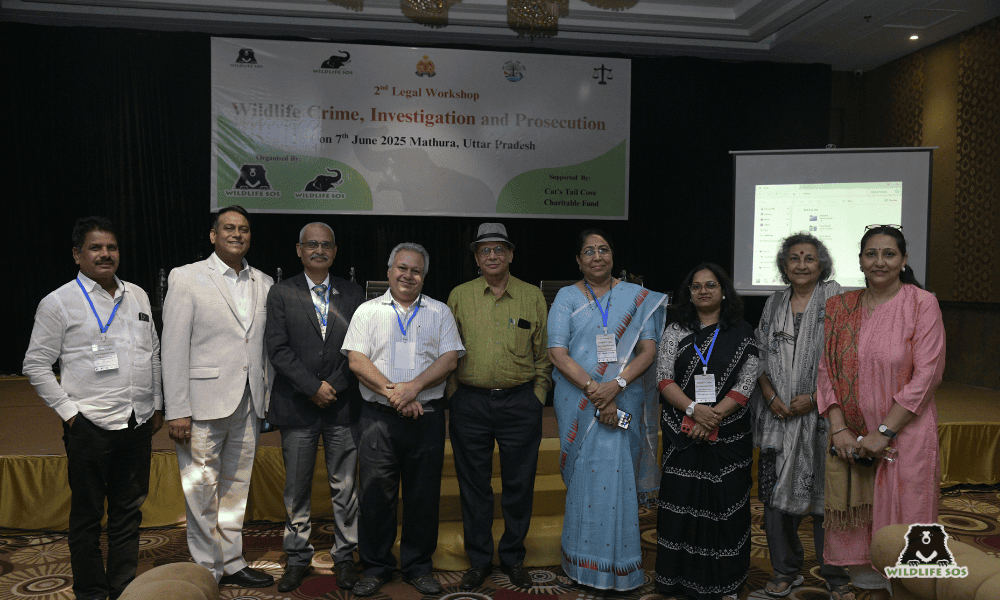
Popular Wildlife Crimes: India’s Hidden Crises
Wildlife crime is no longer the shadowy act of a lone poacher in a forest, waiting for their chance to take a baby elephant from its maternal herd or waiting to attack a lone tiger. With advancement in technology, it has spanned global trafficking networks, cyber markets, and backdoor auction houses. Not to mention the growing amount of misinformation that declares animal parts and rare plants as the next magical ingredient for their medicinal concoction. It’s a planned crime fuelled by international demand, often coordinated through encrypted networks, darknet marketplaces, and deceptive packaging. Here are some of the most common crimes committed against our wildlife:
- Poaching and Trafficking of Wild Animals: Despite being protected under Schedule I of Wildlife (Protection) Act, 1972, animals like leopards, tigers, and pangolins, are hunted for body parts that are used in traditional medicine or are sold in the black market. Live reptiles and exotic birds are traded to become fancy pets. Bear bile extraction persists. Pangolin scales, once considered obscure, are now trafficked globally as prized ingredients in pseudoscientific medicines.
- Abuse in Captivity: Animals such as Asian elephants are captured from the wild as infants, and using the brutal act of phajaan, they are trained to beg, entertain, carry heavy loads or tourists on their backs, and partake in cultural processions.
- Smuggling venom: Snake venom smuggling, particularly involving cobras and kraits, fuels an illegal trade where venom is collected and sold without regulation. This unverified venom is often supplied to unauthorised laboratories or individuals attempting to manufacture anti-venom, bypassing safety protocols and quality control. The resulting products are unsafe, illegal, and pose serious health risks.
While the legal framework exists, enforcement and conviction depend on how well forest officials, investigators, and prosecutors collaborate to stop the suffering of our nation’s wildlife.
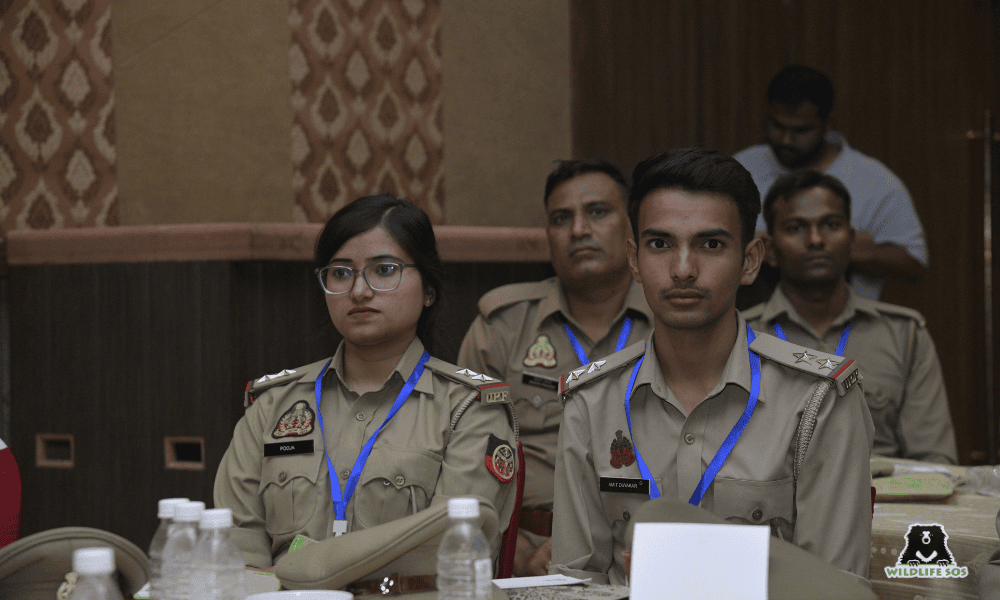
Law as a Living Tool: The Path Ahead
The Wildlife (Protection) Act, 1972 provides a robust structure — with recent amendments made to Schedules I to VI, several species are ranked under priority protection, with punishments of up to six years of imprisonment and heavy fines for Schedule I offences. But law, as the workshop demonstrated, is only as effective as those who implement it. There is a growing consensus among field officers and legal experts alike that capacity-building workshops must become regular, decentralised, and tailored to regional threats.In that spirit, Wildlife SOS remains committed to not just saving animals in distress — but to empowering the system that is meant to protect them. With initiatives like the Forest Watch that consists of an anti-poaching intelligence team, and legal aid for enforcement personnel, the organisation is helping push the wildlife crime response from reactive to proactive.If law is a weapon, then training is the sharpening of that blade. We extend our sincere gratitude to all dignitaries, speakers, officers, and participants for their time, insights, and unwavering commitment. Your presence turned this workshop into a movement — and we thank you for standing with us in defence of India’s wildlife! If you wish to be a part of our missions and help conserve our wildlife from such peril, please donate towards our cause or support us by sponsoring our rescued and rehabilitated animals. Feature image: Vineet Singh/ Wildlife SOS

